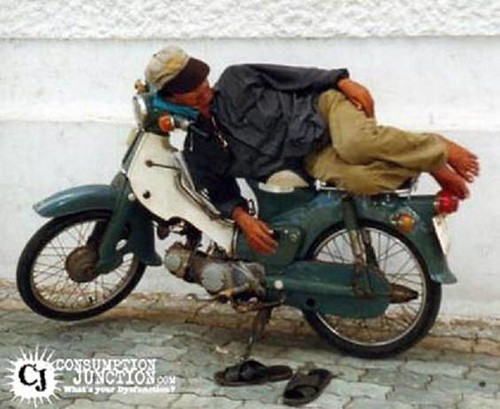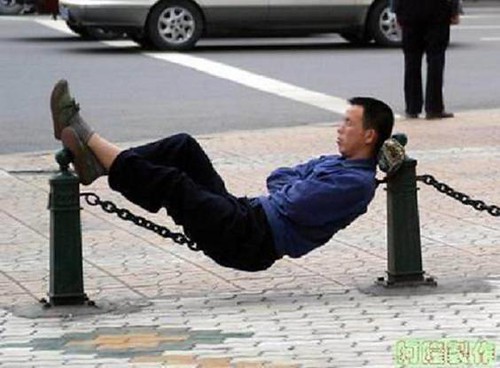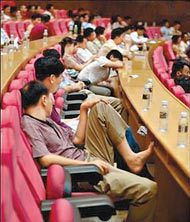"I remember a vomiting spout I had when...my parents drove up the Rockies in an RV."
"I once had a weird pressure problem in my ear. I think it was from scuba diving...It lasted a month, which at the time, I was cursing...It took a while, and it felt like it would never go away, but it did go away"
"I have often had incidents, though, days after a plane ride, when suddenly there is a vacuum-like sound (or a sound like a clogged bathtub drain emptying) in my head "
Yet while I was travelling in Yunnan, other than a few old folks having trouble holding their lunches, nearly everyone seemed everyone else seemed pleasantly acclimated to the altitude changes, and nearly everyone my age appeared to have no problem whatsoever. One of the most interesting explanations I've heard for this is the idea of Han Chinese being better, genetically, than Westerners at this type of activity.
Now, I'm no fan of nationalism in general, and Chinese nationalism in particular, and I'm not breaking out a chant of "Bricka Bracka Firecracka, Bish Boom Ba. Han People, Han People, Rah Rah Rah" to demonstrate their obvious racial superioity or anything. But I do think in this particular case, it may be justified, though I don't have the scientific evidence to prove it.
Essentially, the case is that China and the United States have a very similar geographic area, but China has a population of 1.3 billion people while the U.S. has 300 million. In addition, much of the land in China has been fairly well settled for a few thousand years, and in the time before large cities were the standard mode of living, while the U.S. has been fully settled for a few hundred years, occurring at the end of industrialization and after people had first begun shifting to cities. Therefore, due to geographic constraints, Chinese people were forced to live in places both very hot and cold, up and down, wherever they could find a small spell of flat land to call their own. Their genetic makeup became much more suitable for shifts in temperature and altitude, resulting in a present-day populace that means even the urban dwellers have within them an ability to withstand great changes in climate or height.
So the theory goes. I personally think it makes sense especially if you think about not just that fact that nearly every nook and cranny of this country has somebody living there, but also Chinese seem to be extremely adept at sleeping just about anywhere. I could be wrong of course, but I think its related: while I have great trouble sleeping anywhere not flat, dark, and quiet, I've become convinced over the past few years that Chinese people really can sleep anywhere at any time. This, of course, is a good excuse to post some cool pictures of Chineese people sleeping. How could something else genetic not be going on? Take a look at some of these pictures, from China Moon, ESWN, and some other places.






Of course, that last one is from a People's Congress, and really who wouldn't fall asleep during one of those babies. So that's a theory, and I think it possibly holds some water. But let's ask ex-President Jiang Zemin what he thinks of my theory about geographic constraints prompting Han people to have better responses to their physical environemnt than Westerners:

Oh, well then.
"I once had a weird pressure problem in my ear. I think it was from scuba diving...It lasted a month, which at the time, I was cursing...It took a while, and it felt like it would never go away, but it did go away"
"I have often had incidents, though, days after a plane ride, when suddenly there is a vacuum-like sound (or a sound like a clogged bathtub drain emptying) in my head "
"he was in the prenatal position under the seat of the plane moaning and holding his ear and had never had such great pain"
Yet while I was travelling in Yunnan, other than a few old folks having trouble holding their lunches, nearly everyone seemed everyone else seemed pleasantly acclimated to the altitude changes, and nearly everyone my age appeared to have no problem whatsoever. One of the most interesting explanations I've heard for this is the idea of Han Chinese being better, genetically, than Westerners at this type of activity.
Now, I'm no fan of nationalism in general, and Chinese nationalism in particular, and I'm not breaking out a chant of "Bricka Bracka Firecracka, Bish Boom Ba. Han People, Han People, Rah Rah Rah" to demonstrate their obvious racial superioity or anything. But I do think in this particular case, it may be justified, though I don't have the scientific evidence to prove it.
Essentially, the case is that China and the United States have a very similar geographic area, but China has a population of 1.3 billion people while the U.S. has 300 million. In addition, much of the land in China has been fairly well settled for a few thousand years, and in the time before large cities were the standard mode of living, while the U.S. has been fully settled for a few hundred years, occurring at the end of industrialization and after people had first begun shifting to cities. Therefore, due to geographic constraints, Chinese people were forced to live in places both very hot and cold, up and down, wherever they could find a small spell of flat land to call their own. Their genetic makeup became much more suitable for shifts in temperature and altitude, resulting in a present-day populace that means even the urban dwellers have within them an ability to withstand great changes in climate or height.
So the theory goes. I personally think it makes sense especially if you think about not just that fact that nearly every nook and cranny of this country has somebody living there, but also Chinese seem to be extremely adept at sleeping just about anywhere. I could be wrong of course, but I think its related: while I have great trouble sleeping anywhere not flat, dark, and quiet, I've become convinced over the past few years that Chinese people really can sleep anywhere at any time. This, of course, is a good excuse to post some cool pictures of Chineese people sleeping. How could something else genetic not be going on? Take a look at some of these pictures, from China Moon, ESWN, and some other places.






Of course, that last one is from a People's Congress, and really who wouldn't fall asleep during one of those babies. So that's a theory, and I think it possibly holds some water. But let's ask ex-President Jiang Zemin what he thinks of my theory about geographic constraints prompting Han people to have better responses to their physical environemnt than Westerners:

Oh, well then.




